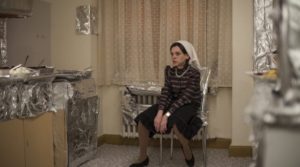Happy Passover! Jewish Representation in Unorthodox

Mini-Series Unorthodox gives audiences a glimpse into the Orthodox Jewish community of Williamsburg, Brooklyn. We get to specifically follow a young woman named Ester Shapiro who, after being married off and forced to procreate with a man she doesn’t love, flees the only home she has ever known to start a new life in Berlin. Throughout the show, we see glimpses into her past and her experiences with Jewish Traditions, and the overall intensity of the Orthodox community. We get to see pieces of Wedding rituals, weekly Shabbos traditions, protocols for having sex, and even how the Hassidic Orthodox community observes Passover, (which is being observed this week by Jewish People around the world in many different capacities.) Passover is a holiday that focuses on remembrance, specifically remembering the plights of the Jewish people in our past. Reformed Jews, as well as Orthodox, traditionally hold a Sedar which is shown in part in the fourth episode of Unorthodox. In honor of my Jewish heritage and Passover, I want to pick apart some of the pieces of this show and better understand the importance of Jewish Representation in media and how this somewhat negative representation can affect how non-Jews view us.

If I had to guess, about half of this show is spoken in Yiddish and half in English. This balance shows how intently the Hassidic community has kept such an old language alive where the rest of the world has pretty much ignored its existence. To someone who has never attended Shul or learned Hebrew, Yiddish can sound like any other Eastern European language. To me (A reformed Jew who never learned Yiddish), I hear small phrases tossed around by my mother or my grandmother and a less traditional version of the Hebrew I learned to be Bat Mitzvahed. Even though Ester (Esty), played by Israeli actress Shira Haas, has lived in New York her whole life, she has a thick accent that makes people in Berlin think she is from Europe or Israel. Esty works up the confidence to break free of the community she was raised in because of how deeply uncomfortable the traditions surrounding sex made her on a weekly basis. When her husband Yanky, played by Amit Rahav, started to believe that Esty would not be able to provide him a child, he asked to divorce her. Esty weekly participates in these traditions by cleansing herself in a holy pool of water called the Mikvah and has no other choice but to have sex with her husband. There is very little consent involved in this procedure which is in part why I believe Esty had no other choice but to flee. Esty goes to Berlin in hopes to provide a better, safer, and more love-filled life for her child before her husband finds out about it and she is forced to stay.

When Esty arrives in Berlin, Germany she has still dressed appropriately for her Hassidic community. She has her hair covered by a wig, she wears several layers of modest clothing, and she acts and speaks very modestly. Shortly after arriving, she is introduced to a fascinating group of talented musicians who she follows to a lake known for holding Nazi activity during the holocaust as well as playing a role in the separation of Berlin with the Berlin wall. When one of her new friends explains that, despite all of the negative history surrounding this lake, people are now free to swim in the lake as they please. There is a beautiful moment where Esty enters the lake, fully clothed, and removes her head covering exposing her buzz-cut hair to leave behind her wig forever. Women in the Hassidic community shave their heads to ensure that their hair will never be seen by men to preserve their modesty. There are plenty of ways in which the men in this community portray their commitment to the religion that is shown throughout this show including the garments they wear. The rabbis along with Esty’s husband Yanky wear Yarmulkes and Tzitzit daily under modest clothing and style their hair with Payot, the curls you see coming from underneath their Yarmulkes. In more reformed traditions, Yarmulkes and Tzitzit are worn only during religious ceremonies or in Shul. While the men in this community are more recognizable from a distance due to their traditional garments, the women are shown sacrificing way more than their daily comfort in clothing.

One of the friends Esty meets in Berlin, Yael, played by Tamar Amit-Joseph, is Jewish yet conforms to more of the reformed sect of the religion. She does not cover her hair or dress modestly but identifies with her Israeli and Jewish heritage. This proves to Esty that the different levels of Judaism are at her disposal. Esty can still practice and identify with her religion without being oppressed for her womanhood. I believe Unorthodox does a great job with this by representing that not all Jews oppress women in the way that Esty’s specific Hassidic community does. As someone who has traveled to Israel and has experienced the ways in which the Orthodox/ Hassidic community often requires women to dress a certain way and separate from the men in most religious settings, I found it antiquated and somewhat uncomfortable being a woman in these settings. Esty never knew any other way but eventually realizes that the rules established by her community are in a way “all made up.”

This story about a lost woman finding her place in the world is incredibly beautiful to watch. Though Unorthodox doesn’t follow Esty into her future, it makes audiences believe that it is possible to find a compromise between religion and freedom. Esty is a courageous, intelligent, and overall amazing female lead for this show and I think she represents the Jewish community in a beautiful way. Jewish people are not confined by their traditions or their pasts as some content portrays them to be (Fiddler on the Roof.) The overall representation of Jewish people along with a strong female lead made this show so amazing to experience, regardless of it being so short. Truthfully, I was left wanting so much more.
Inclusive Score: 5
Movie/ TV Score: 5
TV Review originally published by Allie Posner on Medium
More to explore
By Same Author
Related lists created by the same author





